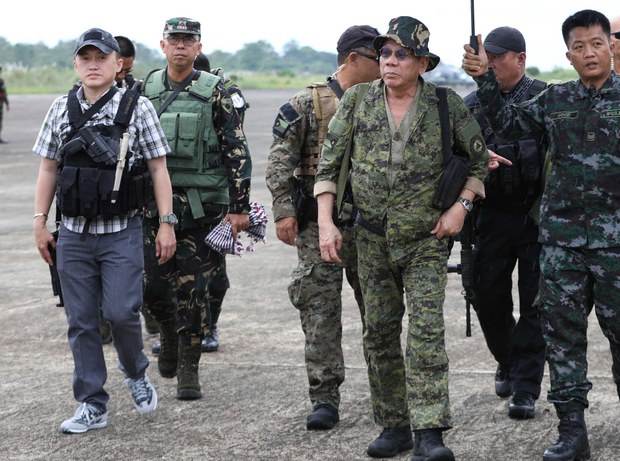Philippines: No End in Sight as Marawi Battle Enters Third Month
2017.07.21
Manila
 Philippine President Rodrigo Duterte (center) visits troops on the southern island of Mindanao, July 20, 2017.
Philippine President Rodrigo Duterte (center) visits troops on the southern island of Mindanao, July 20, 2017.
As the battle to retake Marawi City from militants linked to Islamic State (IS) enters its third month this weekend, the Philippine Congress is expected to prolong military rule over the entire southern Mindanao region until December.
This likely extension of martial law in the south, sought by President Rodrigo Duterte, is a tacit and embarrassing admission from him that a large-scale military solution to end the crisis swiftly has failed so far.
Duterte admitted that leaders of the Abu Sayyaf and Maute groups appear to be alive and directing the violence, which has killed 99 soldiers, 421 militants and 45 civilians, according to a letter he sent to Congress this week, in which he argued for a prolongation of martial law.
The president said that of the 600 or so militants known to be in Marawi since fighting began on May 23, about 220 were alive and posed a danger as they are entrenched in four villages in the central part of the city. This goes against the military’s estimates that only 60 fighters remain in the area.
“Parts of Marawi city, comprising around four (villages) are still under the control of the rebels,” Duterte wrote in the letter read by BenarNews on Friday. “The city’s commercial districts, where about 800 structures are located, are found within these areas.”
Speaking to businessmen on Friday, Duterte said troops were prepared for the long haul because the gunmen were believed to be holding about 300 civilian hostages. He did not say where he got the information.
So “no assault there. If we have to wait for one year (to end the crisis), let us wait for one year,” Duterte said.
Militant leaders ‘at large’
Troop movements have been restricted because the gunmen are hiding in structures with hostages, including madrassas, making it difficult for troops to attack at will.
Abu Sayyaf commander and the self-styled leader of IS in the Philippines, Isnilon Hapilon, and brothers Omarkhayam and Abdullah Maute also remain at-large, despite earlier reports by the military that they had been killed or had escaped.
A Malaysian militant, Mahmud bin Ahmad, who allegedly collected IS funds to support the fighters and purchase weapons, is believed to be in the area, according to Duterte. Previous reports stated that the militant had been killed or had fled to Indonesia or Malaysia.
Meanwhile, only a dozen of the government’s wanted list of 300 Maute and Abu Sayyaf fighters have been arrested.
The government said the groups were backed by fighters from Southeast Asia and the Middle East, a fact that has complicated the military effort.
“The rebels have been found to possess high-powered and military-grade weapons such as rocket-propelled grenades and a large supply of ammunition,” the president said. “There have been reported entries of reinforcements, weapons, ammunition and other logistical supplies from outside Marawi city through clandestine routes.”
Special Congressional session
Congress, dominated by Duterte allies, is expected to convene a special session Saturday to discuss the martial law extension. The measure is likely to pass, which according to Duterte’s chief critic, Sen. Leila de Lima, “seems egregiously excessive.”
De Lima, who has been detained on drug charges she says were orchestrated by Duterte, urged the president’s colleagues not to abdicate their duty and deliberate on martial law even as she said it appears the measure would surely pass.
“The extension of martial law in the whole of Mindanao beyond another 60-day period is not only excessive, it is also unconstitutional,” de Lima said. “Definitely, it already smacks of authoritarian rule, when a president, even with his conscientious use of all intelligence information, cannot possibly predict if the conditions justifying military rule will continue to exist up to December.”
She accused Duterte of being a tyrant who was slowly weaning the Philippines away from democracy toward perpetual martial law.
Opposition congressman Gary Alejano, a former Marine officer who once joined a failed mutiny against the government, said it was clear that Duterte was setting up things toward an authoritarian rule.
“He had found justification in the Mautes’ attack in Marawi even if the crisis could be addressed by calling the military to address such lawless violence even without martial law,” Alejano told BenarNews.
He said military rule in the south was a test case to see how the people would react if he expanded martial law to cover the whole country.
But National Security Adviser Hermogenes Esperon, who on Thursday joined Duterte in a surprise visit to Marawi, said he expected a slower military advance as militants control the four villages. He could not give a timeline for an end to fighting, but stressed that there remains an imminent threat, especially from foreign fighters who could be arriving and joining IS.
Richel V. Umel in Marawi contributed to this report.







